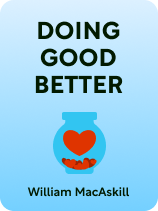

This article is an excerpt from the Shortform book guide to "Doing Good Better" by William MacAskill. Shortform has the world's best summaries and analyses of books you should be reading.
Like this article? Sign up for a free trial here.
Are you looking for a career that makes a difference? Have you considered how to maximize your impact on the world through your work?
In his book Doing Good Better, William MacAskill explores the concept of altruistic careers. He offers guidance on how to choose a career path that aligns with your values and maximizes your positive impact. MacAskill presents three key considerations for evaluating potential careers.
Read on to learn how to take into account personal alignment, immediate impact, and long-term potential when evaluating your career choices.
A Career That Makes a Difference
According to MacAskill, the first decision that effective altruism can inform will determine how you spend 80,000 hours of your life—namely, which career you should pursue. He argues that, regardless of whether you decide to earn to give or work directly for altruistic causes, you should assess future careers along three considerations: How well do you personally align with the career? What will your immediate impact be? And what’s the long-term impact of your career?
Let’s look at how answering these questions can help you find a career that makes a difference.
Question #1: Alignment
First, MacAskill contends that careers that offer strong personal alignment are most conducive to effective altruism. He explains that, in careers that suit you well, you’ll be more likely to work productively and more resistant to burnout, meaning your long-term impact will be greater.
(Shortform note: Experts recommend various strategies for deciding whether a job aligns well with you. For example, you should assess your needs and boundaries, and see whether your job meets your needs while also respecting your boundaries. Further, these experts recommend reflecting on your underlying motivations, then searching for jobs that allow you to pursue those motivations.)
To find such careers, MacAskill recommends that you focus less on nebulous notions like your “calling” or “passion” and instead seek out careers with features that, according to research, are predictive of job satisfaction. For example, you should seek out careers that offer you a sense of autonomy over your work and allow you to perform an array of interesting tasks. Moreover, he says, research suggests that work with a tangible, positive impact on other people is more likely to satisfy you.
(Shortform note: Research has revealed that in addition to valuing autonomy and interesting work, several other factors are predictive of job satisfaction. For instance, workers are happier when they have strong job security, a consistent and competitive salary, and positive relationships with their coworkers and superiors.)
Question #2: Immediate Impact
Next, MacAskill writes that you should consider the immediate impact that you’ll have on the job. He maintains that this immediate impact occurs in two primary ways—first, via the actual labor that you perform on the job, and second, via the money you can earn and donate to worthy causes.
Regarding your actual labor, if you pursue a career at an altruistic organization then you can directly improve the lives of those around you. However, MacAskill warns that you have to remember to assess the counterfactual to determine your actual impact—you don’t merely need to do good work in your job, but rather better work than the person who would have gotten your job in your place. For example, in a social work organization with sufficient staffing, your job would’ve likely been filled by another competent social worker had you declined, meaning your net impact might actually be fairly small.
(Shortform note: In most cases, working within a preexisting organization fails the counterfactual test because your actual impact will only be the difference between your results and the results of the person who would’ve otherwise gotten your job. For this reason, effective altruists recommend trying to found impactful organizations instead. After all, if you establish an altruistic organization that wouldn’t have otherwise existed, your counterfactual impact will be much greater.)
MacAskill says that earning to give, on the other hand, passes the counterfactual test—because few individuals donate a significant amount of money, the person who would have gotten your job in your place likely wouldn’t have donated significantly. For example, if you’re a corporate lawyer who chooses to donate (say) $100,000 annually, it’s likely that the person who would’ve taken your job had you worked elsewhere would not have donated as much.
(Shortform note: In Going Infinite, Michael Lewis relates that Sam Bankman-Fried—the founder of cryptocurrency exchange FTX—became a Wall Street trader in the first place because he was convinced by MacAskill’s arguments about earning to give. However, Bankman-Fried’s embrace of effective altruism didn’t have a happy ending; although Bankman-Fried became a multibillionaire with FTX, he was sentenced to 25 years in prison for fraud after losing billions from his users. That said, Bankman-Fried did donate an estimated $100 million to various political causes, though several lawsuits from FTX’s clients are trying to claw back that money.)
Question #3: Long-Term Impact
Finally, MacAskill recommends that you assess the long-term impact of your job, specifically in terms of the skills and knowledge that you’ll develop. He points out that, in certain jobs, the organizational experience you gain can prove valuable if you decide to transition to a different career later in life. For instance, although working in business directly out of college might feel less altruistic than joining a non-profit, the experience you gain managing employees can pay dividends if you decide to shift to a non-profit later in your career.
(Shortform note: Another way to determine the long-term impact of your job is by assessing the transferable skills you’ll gain from it. Transferable skills—that is, skills that are crucial across a wide range of industries, rather than in one industry alone—could include communication, decision-making, and leadership.)

———End of Preview———
Like what you just read? Read the rest of the world's best book summary and analysis of William MacAskill's "Doing Good Better" at Shortform.
Here's what you'll find in our full Doing Good Better summary:
- How you can save hundreds of lives by being a good person
- The principles behind the effective altruism movement
- How to determine which charities are worth funding






